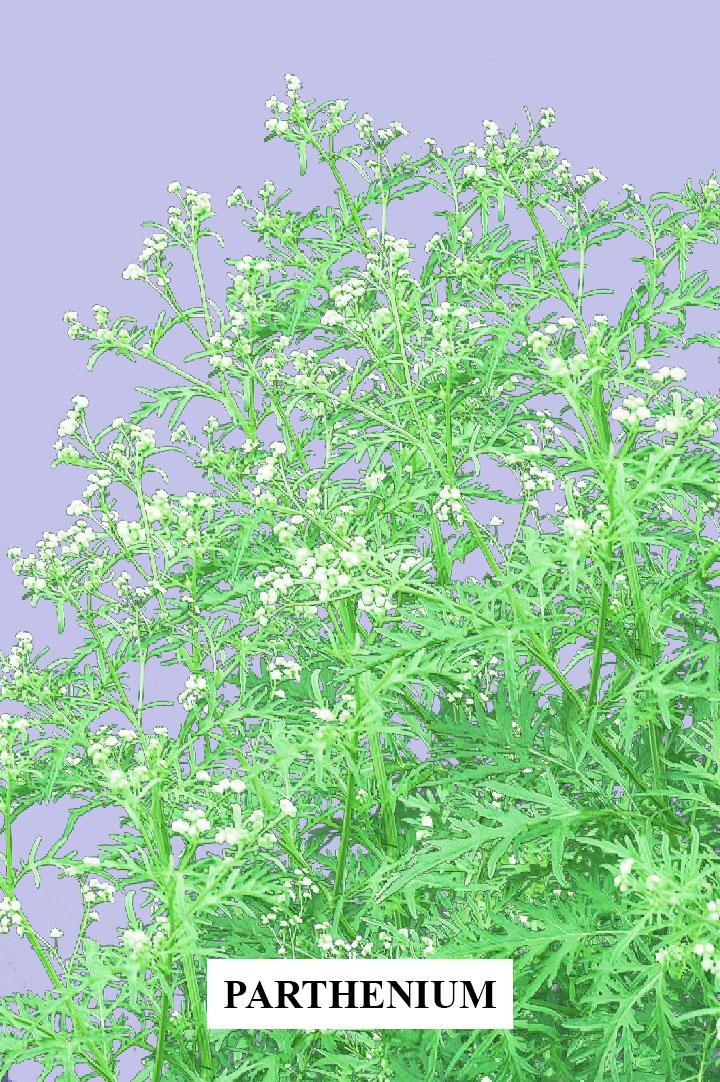
Congress/Carrot Grass is
(a) Carthamus oxycantha
(b) Echinops echinatus
(c) Eupatorium odoratum
(d) Parthenium hysterophorus
Answer
579.6k+ views
Hint: Congress/Carrot Grass is a foreign weed which has created havoc in the fields and reduced the yield of crops by growing at a large population. They produce toxic biochemicals that affect the neighboring plants, grazing animals as well as humans.
Complete answer:
Carrot grass grows in subtropical areas of North and South America. It belongs to the family of Asteraceae. It is known by many regional names like Santa-Maria, whitetop weed, and famine weed. But in India, it is commonly known as Gajar Ghans, a literal translation of carrot grass. But its scientific name is Parthenium hysterophorus. It has been found to be an invasive species. It got introduced in India as a contaminant of imported wheat and since then, it has created havoc in the growth of local plants due to its fast germination rate, absorption of nutrients, and better survivability rate.
Additional Information: Its harmful effects have been due to its allelopathic effects. It is a biological phenomenon wherein a plant produces certain biochemicals that influence the germination, growth, and survival of its neighboring plants or animals. The influence can have a positive outcome or a negative one. In the case of Parthenium hysterophorus, the effects are of a negative nature. Though these chemicals may be of no use by the plant itself, it inhibits metabolic functioning if its neighbors. The carrot grass produces a toxic chemical named ‘parthenin.’ It causes respiratory problems in the grazing animals and in certain cases, has been found to be responsible for the bitter taste of milk in the livestock which might have eaten them. Its pollen also causes allergic problems like bronchitis, asthma in humans.
So, the correct answer is ‘ Parthenium hysterophorus.’
Note: -Though it is mostly harmful, it has been found useful in certain medical conditions such as in inflammation, urinary tract infection and malaria, etc.
- Its growth is controlled in crop fields by the traditional application of herbicides like Paraquat. Biocontrol methods like the release of beetles in the field to feed on Parthenium and thus destroy them.

Complete answer:
Carrot grass grows in subtropical areas of North and South America. It belongs to the family of Asteraceae. It is known by many regional names like Santa-Maria, whitetop weed, and famine weed. But in India, it is commonly known as Gajar Ghans, a literal translation of carrot grass. But its scientific name is Parthenium hysterophorus. It has been found to be an invasive species. It got introduced in India as a contaminant of imported wheat and since then, it has created havoc in the growth of local plants due to its fast germination rate, absorption of nutrients, and better survivability rate.
Additional Information: Its harmful effects have been due to its allelopathic effects. It is a biological phenomenon wherein a plant produces certain biochemicals that influence the germination, growth, and survival of its neighboring plants or animals. The influence can have a positive outcome or a negative one. In the case of Parthenium hysterophorus, the effects are of a negative nature. Though these chemicals may be of no use by the plant itself, it inhibits metabolic functioning if its neighbors. The carrot grass produces a toxic chemical named ‘parthenin.’ It causes respiratory problems in the grazing animals and in certain cases, has been found to be responsible for the bitter taste of milk in the livestock which might have eaten them. Its pollen also causes allergic problems like bronchitis, asthma in humans.
So, the correct answer is ‘ Parthenium hysterophorus.’
Note: -Though it is mostly harmful, it has been found useful in certain medical conditions such as in inflammation, urinary tract infection and malaria, etc.
- Its growth is controlled in crop fields by the traditional application of herbicides like Paraquat. Biocontrol methods like the release of beetles in the field to feed on Parthenium and thus destroy them.

Recently Updated Pages
Master Class 11 Computer Science: Engaging Questions & Answers for Success

Master Class 11 Business Studies: Engaging Questions & Answers for Success

Master Class 11 Economics: Engaging Questions & Answers for Success

Master Class 11 English: Engaging Questions & Answers for Success

Master Class 11 Maths: Engaging Questions & Answers for Success

Master Class 11 Biology: Engaging Questions & Answers for Success

Trending doubts
One Metric ton is equal to kg A 10000 B 1000 C 100 class 11 physics CBSE

There are 720 permutations of the digits 1 2 3 4 5 class 11 maths CBSE

Discuss the various forms of bacteria class 11 biology CBSE

Draw a diagram of a plant cell and label at least eight class 11 biology CBSE

State the laws of reflection of light

Explain zero factorial class 11 maths CBSE




